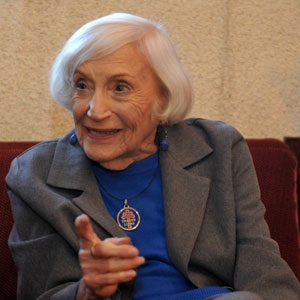




Dir: Nicola Hans | Doc 86′
“Always be alert, and don’t accept orders you can’t follow with an open heart” That’s the message a one time spy offers to young people today.
Marthe Cohn, aka Chichinette, who wrote bestseller Behind Enemy Lines, travelled extensively to talk about her clandestine wartime experiences, was a a tiny chic blond woman with a white crop of hair, blue eyes, and a ready smile: No one would believe she was once an underground agent against the Nazis. Or that she managed to live to be over a 100.
Nicola Han’s lively, part-animated documentary plays out like a travelogue, full of enjoyable anecdotes from the vivacious one time secret agent who is seen again packing her case in California for a trip to Paris with her husband Major Cohn. French born and bred, she nevertheless claims to have felt ‘very German’ during the Second World War when she lived as a 19-year-old with her family in Nazi occupied Western France.
Born Marthe Hoffnung in 1920 Metz, where he father was a rabbi, Marthe spent an agreeable childhood with her brothers and sisters in a decent home. She preferred to read books rather than study and learned Hebrew but couldn’t speak it. But she had to speak German when, at the outbreak of war in 1939, the family moved to Poitiers which was annexed to the Germans.
Marthe set up a shop with her sister, and soon met non-Jewish Jacques Delaunay on the dance floor of the local social club – a happy scene animated with music. As they danced, they decided to get married and planned to move to Vietnam to work in a hospital. But life was soon to get far more serious. The Germans demanded a curfew at 9pm, and Jews were forced to wear the Yellow Star. One day in 1942 an official arrived at the family home and took away Marthe’s older sister Stephanie: She had accidentally signed her real name on a letter, and was sent to a camp near Poitiers. The family tried to help her escape, but Stephanie refused to let them compromise their own security at a time when 25,000 francs was the reward for denouncing a Jewish family. She was later sent to Auschwitz, and the whole family moved on again to Marseilles where Marthe became a nurse, and, on passing her exams, to Paris where she lived with her sister, managing to meet up with Jacques, who died soon after.
But life went on for Marthe. In 1944 the Allies liberated Paris, but the Germans were still fighting for Alsace Lorraine. So Marthe enlisted in the Intelligence Service of the French 1st Army (the French Resistance) and her boss sent her to work in Germany via Switzerland with the new name of Marta Ulrich. After 14 unsuccessful attempts to cross the border at Alsace, she eventually managed to cross the border near Shaffhausen in Switzerland, creeping back and forth to relay intelligence. Her major achievement was to report that the impenetrable Siegfried Line (a defensive Western border built during the 193os) had been subjected to a large scale Allied offensive where the remnant of the German Army where hunkering down in the Black Forest.
Hans echoes the unsettling tone of Marthe’s undercover forays with a convincing technique of posting black ghostly figures moving against the forested landscape of Germany and Switzerland,. Her dangerous journeys were all made on foot from Freiburg – which was being bombed by allied forces at the time. Marthe was awarded medals for her courage – but all she had really wanted was a bicycle: the gruelling trip backwards and forwards was extremely arduous on foot.
In 1945 allied troops marched in South West Germany. And after hostilities ceased, Marthe did eventually make it to Vietnam in 1946 where she soon met the dashing Maj, an anaesthetist. And the rest is history. For her efforts and bravery Marthe got the Medaille Militaire in 1999. She had spent the early years of her marriage supporting Maj in his work. Their roles were reversed, when Marthe became top dog, with Maj following dutifully with the luggage. MT
TRIBUTE TO MARTHE COHN 1920-2025